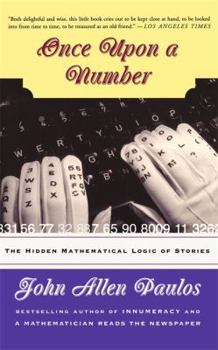Once Upon a Number: The Hidden Mathematical Logic of Stories
Select Format
Select Condition 
Book Overview
What two things could be more different than numbers and stories? Numbers are abstract, certain, and eternal, but to most of us somewhat dry and bloodless. Good stories are full of life: they engage our emotions and have subtlety and nuance, but they lack rigor and the truths they tell are elusive and subject to debate. As ways of understanding the world around us, numbers and stories seem almost completely incompatible. Once Upon a Number shows that stories and numbers aren't as different as you might imagine, and in fact they have surprising and fascinating connections. The concepts of logic and probability both grew out of intuitive ideas about how certain situations would play out. Now, logicians are inventing ways to deal with real world situations by mathematical means -- by acknowledging, for instance, that items that are mathematically interchangeable may not be interchangeable in a story. And complexity theory looks at both number strings and narrative strings in remarkably similar terms. Throughout, renowned author John Paulos mixes numbers and narratives in his own delightful style. Along with lucid accounts of cutting-edge information theory we get hilarious anecdotes and jokes; instructions for running a truly impressive pyramid scam; a freewheeling conversation between Groucho Marx and Bertrand Russell (while they're stuck in an elevator together); explanations of why the statistical evidence against OJ Simpson was overwhelming beyond doubt and how the Unabomber's thinking shows signs of mathematical training; and dozens of other treats. This is another winner from America's favorite mathematician.
Format:Paperback
Language:English
ISBN:0465051596
ISBN13:9780465051595
Release Date:October 1999
Publisher:Basic Books
Length:224 Pages
Weight:0.05 lbs.
Dimensions:0.6" x 5.3" x 8.0"
Customer Reviews
5 ratings
Fast-paced, insightful and totally unique
Published by Thriftbooks.com User , 24 years ago
Of all the science books that I have read, there are only a few that I would classify as a must-read. I definitely put this book in that category. I have never read a Paulos before, and was amazed at how facinating the world of probability and statistics is when it is described this well! Authors of books about the wonders of the universe would be lucky if they could make their subjects as interesting as Paulos makes his.There are four major concepts described in this book: the origins of probability and statistics (in particular how these subjects grew out of our natural observations of the world), the effect of subjective perspectives on our interpretation of both story and statistics, intensional logic (the still little-understood logical structure of this subjective interpretation), and information theory. The book takes a fast-paced, entertaining tour through these topics, and Paulos adds interesting personal anecdotes and bad (intentioanlly) jokes. The book concludes with a discussion of the chasm between the arts and sciences (and those who like to keep it that way).If your looking for a detailed study of any of these topics, however, then this book may not be for you. But this is a good introduction to subjects you may no little about, but will most likely by facinated by when you finish reading.
Insightful and brave
Published by Thriftbooks.com User , 26 years ago
I read Innumeracy many years ago and have been reading Paulos' recent monthly column on abcnews.com and so I bought a copy of Once Upon a Number. I was very surprised at it. It seems to me to be a departure, a brave mathematical foray into the realms of literature and everyday life. The many insights in it are arresting not so much for their mathematical content (although I did minor in math in college) but for the strange new perspectives they provide that are "obvious" only after they've been made. Very intriguing stuff!
Excellent!
Published by Thriftbooks.com User , 26 years ago
Paulos is a strange combination of a mathematician and a story-teller. He tells a story and near the end you realize you learned some math or he does some conceptual math (without equations) that suddenly turns into a story. Good exposition in this book about probability, complexity, literature, etc. Excellent.
A strange and captivating mix of literature and math
Published by Thriftbooks.com User , 27 years ago
I've never read a book on mathematics or science with as much voice and attitude as this one. The similarities between narrative and mathematical thinking (and their differences) are startling and sometimes subtle. What keeps you going are the unusual insights, the witty and funny turns of phrase, and that voice and intelligence which seem to rise from the page. An English major and self-styled math phobe, I learned more about story-telling from this book than from some of my lit courses.
Paulos continues with his amazing mathematical insights
Published by Thriftbooks.com User , 27 years ago
I saw the Salon review of this and promptly ordered it. A little trepidatious at first, I thought the book might be a rehash of Innumeracy and A Mathematician reads the Newspaper, which I loved. I was wrong. The book has Paulos's wry, witty tone and the many examples and insights are characteristically quirky, but the topic is very different - the similarities and differences between stories and mathematics, between their associated logics and world views, and the different mindsets they bring about. Somehow he relates Murphy's Law, the limited complexity of the human brain, topical news stories, bible codes, race issues, and many other amusing tidbits into a coherent argument about our place in the world. And there isn't an equation in sight.





